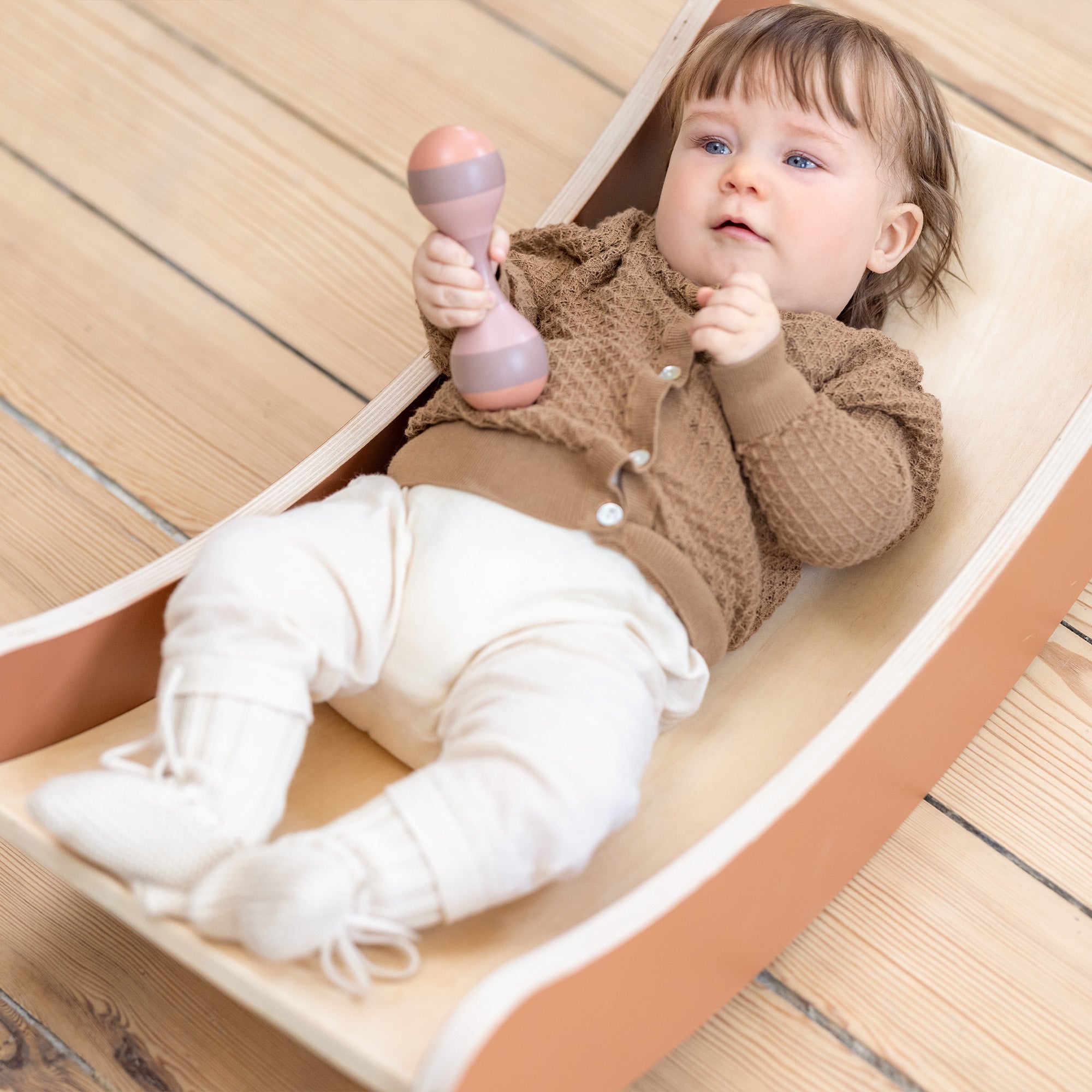The first months of your baby’s life are marvellous but also fastmoving when, in fact, this should be a time for peace and quiet. Every day, your little one reaches important physical and cognitive milestones. With age-appropriate play activities and the right toys, you can nurture your baby’s development – hear what our team of Danish experts recommends for babies aged 0-8 months.
Highlights:
- Mom and Dad’s faces provide plenty of sensory stimulation for a newborn.
- Toys with calm colours and sounds leave room for babies to form their own worldview.
- Let tummy time be your baby’s first physical play activity – it’s great for motor development!
-
At four months, your baby will enjoy playful activities and toys like:
- Singing games where you mimic each other’s sounds and facial expressions.
- Small, physical activities like rolling or blowing raspberries on your baby’s belly.
- Baby-sized rattles designed to train your baby’s hand-eye coordination.
- Activity gyms with a few eye-catching items in different colours and textures.
0-2 Months: Calm Colours & Soft Sounds
Everything is novel to a newborn’s eyes. So, put aside what is trendy and go for toys that you know have a positive effect on your infant’s development. Family advisor, Lola Jensen, shares her thoughts:
“Mom and Dad’s faces provide plenty of sensory stimulation for a newborn. At two months, you can slowly begin to increase the level of activity, but always on your baby’s terms. When it’s time to introduce the first toys, go for toys with subdued colours and gentle sounds, as they leave room for children to form their own, nuanced understanding of the world.”
From 2 Months: It’s Tummy Time!
It’s great to plan tummy time (where your baby lies awake on their stomach) as your baby’s first, physical play activity. The reason for this is your baby’s motor skills evolve from the top down, meaning the head is the first thing your baby learns to control. Then follows the shoulders, arms, and hands, to synchronize a push-up movement for your baby to rest on the elbows and eventually roll over to sit, crawl, and walk.
“In a baby’s waking hours, l always recommend as much tummy time as possible. Tummy time strengthens your baby’s neck, spine, and back. It lays the foundation for a well-functioning sense of balance. And it’s your baby’s entry to a whole new world of movements, like turning the head in the direction of a sound or reaching for something within eyesight,” says expert in babies’ physical development, Mette Vainer Wegloop.
6-8 Months: A Rattlin’ Good Time!
You can now introduce toys and activities that stimulate your baby’s hand-eye coordination, grasping, and communication skills. Expert in children’s play, Joern Martin Steenhold, recommends play activities and toys like:
- Singing games where you look into each other’s eyes and have fun mimicking each other’s sounds and facial expressions. If your baby looks away or turns their head to one side, it means it’s time for a break.
- Small, physical activities like rolling, crossing the midline, or blowing raspberries on your baby’s belly pave the way for your child’s physical development.
- Rattles designed to fit tiny hands, so your child can practice moving objects from one hand to another while experiencing the correlation between movement and sound.
- Activity gyms in subdued colours where your little one becomes familiar with different textures, colours, shapes, and sounds. Again, if your child seems tired, take a little brake in a quiet place.
- Peek-a-boo is a brilliant game for seven- and eight-month-old babies. Your little one will find it endlessly amusing to see your face reappearing time after time, and it’s a game that can help ease your child’s separation anxiety.
Now you’re all set to play – have fun with your little bundle of joy!

